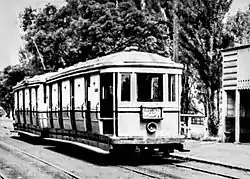Sydney E-Class Tram
The E-class trams were a class of single bogie (four-wheel) single-ended cross-bench design trams operated on the Sydney tram network. They always operated in permanently-coupled pairs because they were fitted-out electrically as if the pair was a single bogie car.[1]
| E-class | |
|---|---|
 E530 & E529 at Centennial Park | |
| Manufacturer | Randwick Tramway Workshops Clyde Engineering Meadowbank Manufacturing Company |
| Constructed | 1901-1903 |
| Number built | 202 |
| Fleet numbers | 396, 397, 413-612 |
| Specifications | |
| Train length | 27 ft 5.5 in (8.37 m) |
| Width | 7 ft 3.5 in (2.22 m) |
| Height | 12 ft 1.5 in (3.70 m) |
| Maximum speed | 60 km/h |
| Weight | 10.02 long tons (10.2 t) |
| Power output | 4 x 48 hp (later 60) |
| Electric system(s) | 600 V DC overhead (trolley) wire |
| Current collector(s) | Trolley pole |
| Track gauge | 1,435 mm (4 ft 8+1⁄2 in) |
History
In 1901, two prototypes were built by the Randwick Tramway Workshops. Deemed a success, a further 200 were built by Clyde Engineering and Meadowbank Manufacturing Company in 1902/03. They were introduced for the electrification of the Eastern Suburbs lines, but also operated services on the North Shore lines.[2]
Withdrawals commenced in 1934; two pairs (499+500 and 529+530) were fitted with track brakes for the Neutral Bay service, with 529+530 lasting in service until 1955.[2]
Numbers
- Randwick Tramway Workshops: (1901) 396, 397
- Clyde Engineering: (1902/03) 413-560, 611, 612
- Meadowbank Manufacturing Company: (1902/1903) 561-610
References
- McCarth & Chinn (1974). New South Wales Tramcar Handbook 1861-1961. SPER.
- MacCowan, Ian (1990). The Tramways of New South Wales. Oakleigh: Ian MacCowan. pp. 116/117. ISBN 0 949600 25 3.
- "Sydney Tramway Museum Fleet Register" (PDF). Sydney Tramway Museum. Retrieved 4 September 2013.
Further reading
External links
![]() Media related to Sydney E-Class Tram at Wikimedia Commons
Media related to Sydney E-Class Tram at Wikimedia Commons